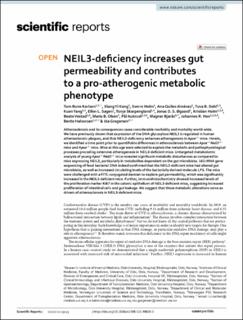| dc.contributor.author | Karlsen, Tom Rune | |
| dc.contributor.author | Kong, Xiang Yi | |
| dc.contributor.author | Holm, Sverre | |
| dc.contributor.author | Quiles-Jiménez, Ana M T | |
| dc.contributor.author | Dahl, Tuva Børresdatter | |
| dc.contributor.author | Yang, Kuan | |
| dc.contributor.author | Sagen, Ellen Lund | |
| dc.contributor.author | Skarpengland, Tonje | |
| dc.contributor.author | Øgaard, Jonas | |
| dc.contributor.author | Holm, Kristian | |
| dc.contributor.author | Vestad, Beate | |
| dc.contributor.author | Olsen, Maria Belland | |
| dc.contributor.author | Aukrust, Pål | |
| dc.contributor.author | Bjørås, Magnar | |
| dc.contributor.author | Hov, Johannes Espolin Roksund | |
| dc.contributor.author | Halvorsen, Bente | |
| dc.contributor.author | Gregersen, Ida | |
| dc.date.accessioned | 2022-04-12T09:15:31Z | |
| dc.date.available | 2022-04-12T09:15:31Z | |
| dc.date.created | 2022-01-12T14:39:30Z | |
| dc.date.issued | 2021 | |
| dc.identifier.citation | Scientific Reports. 2021, 11 (1), . | en_US |
| dc.identifier.issn | 2045-2322 | |
| dc.identifier.uri | https://hdl.handle.net/11250/2991029 | |
| dc.description.abstract | Atherosclerosis and its consequences cause considerable morbidity and mortality world-wide. We have previously shown that expression of the DNA glycosylase NEIL3 is regulated in human atherosclerotic plaques, and that NEIL3-deficiency enhances atherogenesis in Apoe−/− mice. Herein, we identified a time point prior to quantifiable differences in atherosclerosis between Apoe−/−Neil3−/− mice and Apoe−/− mice. Mice at this age were selected to explore the metabolic and pathophysiological processes preceding extensive atherogenesis in NEIL3-deficient mice. Untargeted metabolomic analysis of young Apoe−/−Neil3−/− mice revealed significant metabolic disturbances as compared to mice expressing NEIL3, particularly in metabolites dependent on the gut microbiota. 16S rRNA gene sequencing of fecal bacterial DNA indeed confirmed that the NEIL3-deficient mice had altered gut microbiota, as well as increased circulating levels of the bacterially derived molecule LPS. The mice were challenged with a FITC-conjugated dextran to explore gut permeability, which was significantly increased in the NEIL3-deficient mice. Further, immunohistochemistry showed increased levels of the proliferation marker Ki67 in the colonic epithelium of NEIL3-deficient mice, suggesting increased proliferation of intestinal cells and gut leakage. We suggest that these metabolic alterations serve as drivers of atherosclerosis in NEIL3-deficient mice. | en_US |
| dc.language.iso | eng | en_US |
| dc.publisher | Nature Research | en_US |
| dc.rights | Navngivelse 4.0 Internasjonal | * |
| dc.rights.uri | http://creativecommons.org/licenses/by/4.0/deed.no | * |
| dc.title | NEIL3-deficiency increases gut permeability and contributes to a pro-atherogenic metabolic phenotype | en_US |
| dc.type | Journal article | en_US |
| dc.type | Peer reviewed | en_US |
| dc.description.version | publishedVersion | en_US |
| dc.source.pagenumber | 0 | en_US |
| dc.source.volume | 11 | en_US |
| dc.source.journal | Scientific Reports | en_US |
| dc.source.issue | 1 | en_US |
| dc.identifier.doi | 10.1038/s41598-021-98820-0 | |
| dc.identifier.cristin | 1979588 | |
| cristin.ispublished | true | |
| cristin.fulltext | original | |
| cristin.qualitycode | 1 | |

